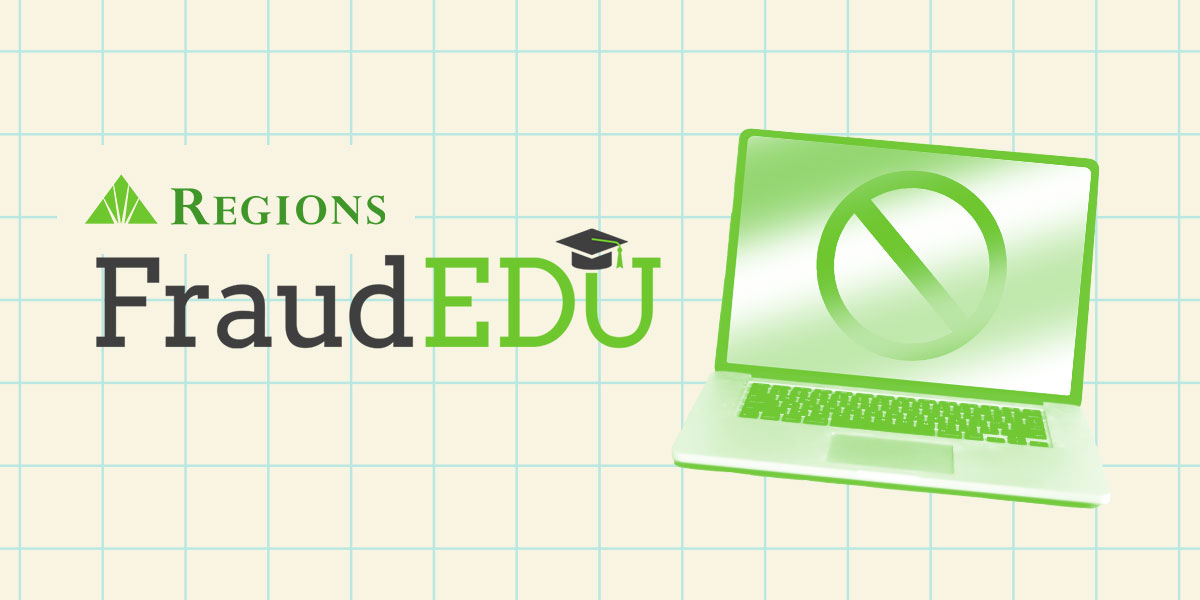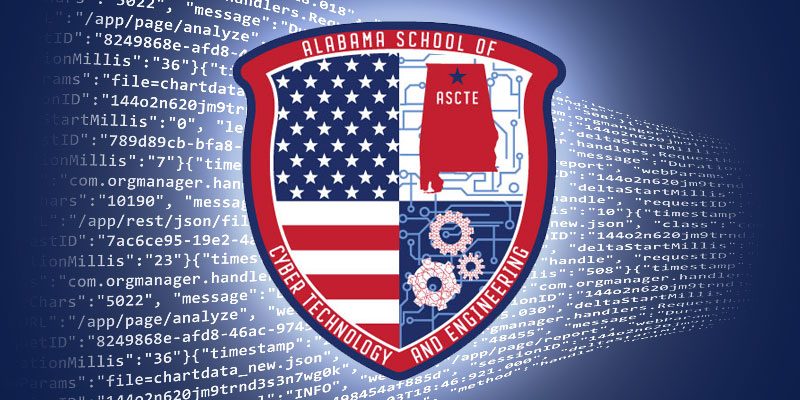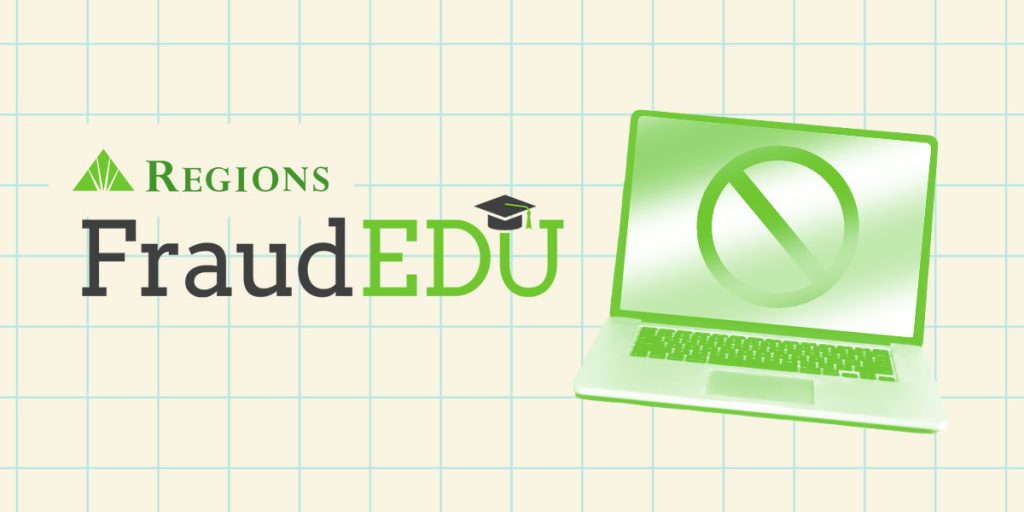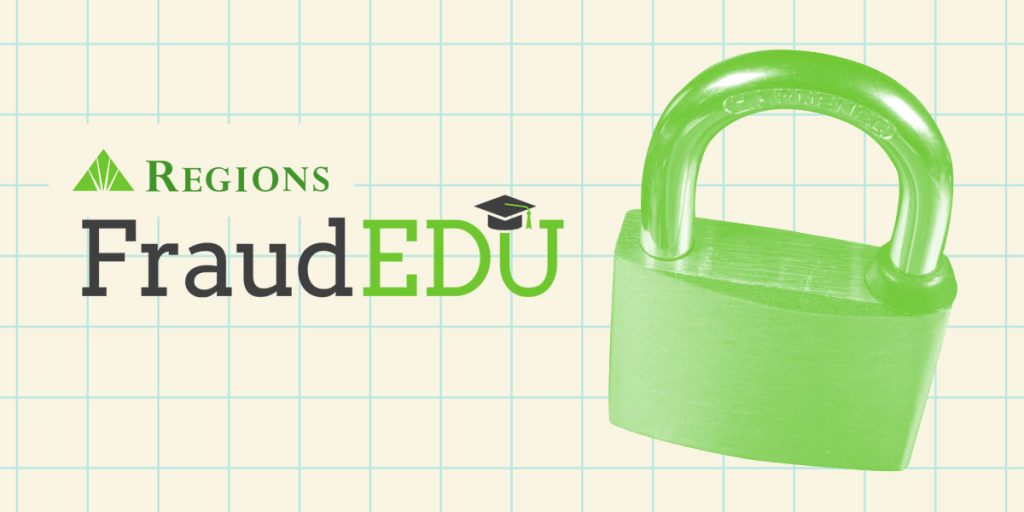Fraudsters never stop adapting their strategies—and neither does Regions Bank when it comes to informing and protecting customers.
As scammers grow more sophisticated in their attempts to steal personal information, Regions is taking an always-on, year-round approach to helping people recognize common schemes and protect what matters most.
One component of this ongoing effort is the #BanksNeverAskThat campaign from the American Bankers Association (ABA), which Regions is once again supporting this October as part of a national push to empower customers to stop fraudsters in their tracks.
It’s a reminder that legitimate banks or credit card companies will not contact you out of the blue and ask for sensitive information.
Regions’ fraud-prevention experts, who work with clients across Alabama and beyond, are emphasizing that awareness is the first line of defense.
“You can stay ahead of the fraudsters and protect yourself by learning how to spot a scam,” said Kimberly Reece, Financial Crimes Customer Advocacy Manager for Regions Bank. “It’s also important to educate your loved ones about these common red flags, particularly when it comes to keeping teens or the elderly safe.”
The best way to do that is to act now to protect your hard-earned cash against phishing scams. The key is recognizing the telltale signs of a phishing scheme, which can come in numerous forms – including through emails, phone calls and text messages.
Phishing is big business, producing $16 billion in losses from Americans in 2024, a substantial increase over the year before, according to the ABA.
So, what’s your best response?
“At Regions, we are committed to financial education, and our efforts to keep our clients, associates and friends informed about fraud are foundational to that promise,” said Jeff Taylor, head of Commercial Fraud Forensics. “National efforts like #BanksNeverAskThat emphasize an effective and consistent message.”
Get scam smart by recognizing these signs from the ABA.
Email Scams
- Unusual Email Address – Slow it down. Does that look like an email address your bank would use? Be wary of unexpected emails from addresses that aren’t like the ones your bank typically employs.
- Misspelled Words – Spot check! If you see misspelled words or odd grammar, they are all clear signs of an impersonator. Real banks use spell check.
- Scare Tactics – Don’t panic. If an email uses scare tactics, such as urgent warnings of account closure or security breaches, you can safely assume it’s a scam.
- Suspicious URLs – Hold up! Banks will never ask you to log in via email. Phishing emails use deceptive URLs to take you to malicious websites. Never click links that you weren’t expecting.
- Unexpected Attachments – Something’s phishy, because real banks will never send an email attachment when you didn’t ask for it. Attachments can contain malware that can compromise your computer or personal information. Never click on attachments from emails supposedly from your bank.
Text Scams
- Strange Phone Numbers – Slow it down. Is that the number your bank usually uses to send text messages? Legit text message updates generally come from “short codes,” official 4-5 digit numbers used by your bank.
- Urgent Warnings or Requests – Take a breath. Phishing texts try to create a sense of panic, such as threatening to suspend your account or urging you to log in to verify. Real bank texts won’t.
- Odd Grammar or Spelling Mistakes – Spot check! If you see misspelled words or odd grammar, they are all clear signs of an impersonator. Real banks use spell check.
- Requests for Personal Information – If a text message requests personal or sensitive information, such as account numbers, PINs, passwords or Social Security numbers, you can assume it’s a scam.
- Suspicious Links – Banks rarely, if ever, send links via text. Don’t click them. Instead, verify the message by visiting your bank’s official website or calling the number on the back of your card.
Phone Scams
- Unusual Caller ID – While caller ID can be spoofed, legitimate calls from your bank are more likely to display an official phone number or a known identifier. If not, be very skeptical.
- Scare Tactics or Threats – Phishing calls rely on a sense of urgency. If the caller pressures you into immediate action or threatens negative consequences, just hang up and call the number on the back of your bank card. Keep in mind, Regions bankers often reach out to thank customers for their business and conduct a needs-based conversation. These calls are intended to answer questions, resolve problems, discover needs and build financial confidence. If a customer is uncomfortable, they can ask for the branch number and call the representative back directly.
Payment App Scams
- Unexpected Requests – Be cautious if you receive unexpected requests from strangers or organizations asking you to send money through a payment app. This is a scammer move.
- Sending Money to Yourself – If someone who claims to be your bank says you have to send money to yourself, or to move money to a “safe” account for protection, you can be 100 percent certain it’s a scam. Banks never ask that.
- Overpayment Claims – Be skeptical if a sender claims to have accidentally overpaid you through a pay app and requests a refund of the excess amount. Scammers use this tactic to trick you into sending them money.
- Suspicious Links – If you receive a payment app-related message that contains a link, never click it. Scammers often send links to fake login pages to steal your username and password.
- Pressure and Urgency – Scammers attempt to trick you by creating a sense of urgency. If they mention unforeseen emergencies, unverified transactions, account suspension, or unsolicited prize winnings, it’s a scam.
Join Regions and the ABA throughout the month of October and learn to spot the red flags of phishing. Print or bookmark these tips for reference the next time you think something’s phishy—and share them with friends, family and co-workers.
By sharing this education, we can help those we care about stay safe.
Never forget: #BanksNeverAskThat.
Think you can spot a scam? Put your knowledge to the test by taking the ABA’s #BanksNeverAskThat quiz at banksneveraskthat.com/scam-quiz. See how scam smart you really are—and challenge your friends and family to take it too.









